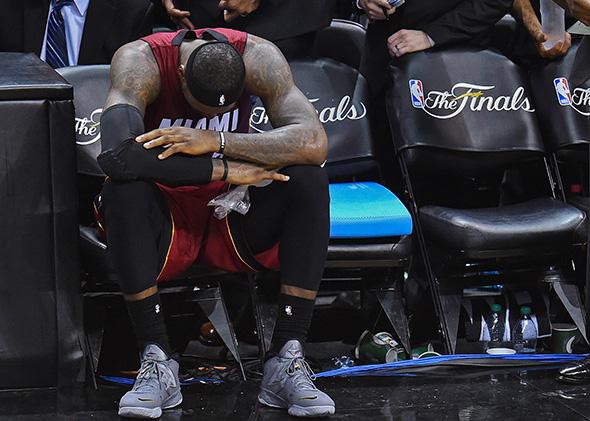Thursday night, the San Antonio Spurs knocked off a hamstrung Miami Heat in Game 1 of the NBA Finals. Faulty circuitry in the Spurs home arena caused the air conditioning to go out and LeBron James’ legs to give out, too. He limped to the sidelines with cramps with 7 minutes, 31 seconds left in the game, then had more of his body lock up (“damn near the whole left side,” he said) after briefly returning. His collapse was inevitable, James lamented afterward—he had lost too many fluids.
Other players seemed fine, so why was James particularly affected?
Two main factors are thought to induce exercise-associated muscle cramps: muscle fatigue and dehydration. Fatigue sets in when the same motions are repeated over and over again, and the normal relaxing and tensing of a muscle can’t continue. The fatigue is localized to the overworked muscles, often in the leg or feet, or whatever part of the body cannot keep sustaining the movement.
A more systematic problem occurs with dehydration and a related loss of electrolytes. The body sweats during exercise to cool down, and minerals like sodium, potassium, calcium, and magnesium get excreted. These minerals are essential for cell function. Too little sodium, for example, causes hyponatremia, in which a cell swells and can’t work properly. When there’s a dearth of these minerals, the body puts them where they’re most needed: the brain and key organs. That means they get stripped from less urgently needed parts, like muscles and the nerves surrounding them. The resulting imbalance of electrolytes around muscles causes cramps.
James claimed that he did all he could to keep from losing too many electrolytes, including taking a sodium pill supplement, but sweating buckets got the better of him. Sweat composition varies from person to person. It’s possible James might be a saltier sweater than his colleagues, meaning he’s more likely to cramp up. Perhaps that’s why heat has sidelined James in the past while his Heat teammates could stay on the court.
Could you adapt to the sorts of conditions James faced in the game? Yes, to some extent, says Michael Bergeron, a sports medicine scientist at the Sanford Sports Science Institute. Exercising the affected muscles regularly can help prevent future muscle fatigue. But this is almost certainly not James’ main problem. Electrolyte loss is the more likely culprit.
On that front there is some good news for him. Bodies do acclimate to temperature, and if you exercise regularly in the same hot conditions, the concentration of sodium lost through sweat will decrease. Tony Parker, the Spurs’ guard, commented that the Game 1 heat didn’t bother him because he played in those conditions all the time in Europe. For James, a few more seasons in steamy Miami, and perhaps a few games outdoors, might help make him feel less like Lot’s wife after a game.
